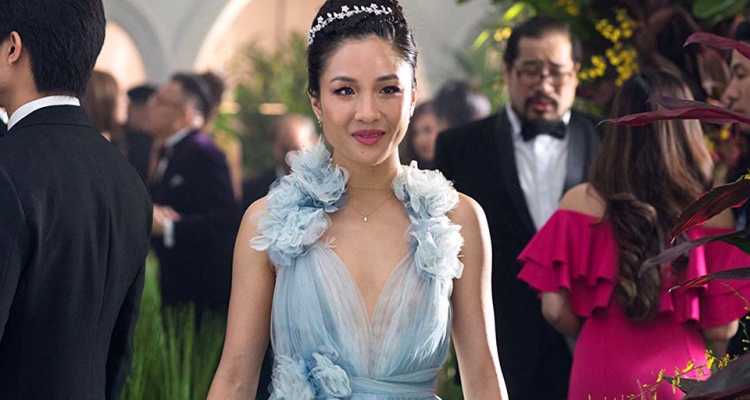It has little to do with the films themselves, and I’m loathed to start a review about outside forces that don’t have anything to do with the quality of a movie, but there’s an anxiety that comes with the era of representational cinema. It goes a little something like this: it’s about time this [insert invisible or underrepresented culture and community] received their due and own movie and I really want this movie to win. But the fear is, what if it’s not good? It’s sweating the representation, or the “rep sweats” as “Fresh Off The Boat” comedian Jenny Yang coined a few years (and in the interest of transparency, I’m reminded of this idea from NPR‘s recent piece about this very phenomenon).
“[Asians] are so invisible, every time you have the opportunity to see yourself on TV, you hold your breath,” she said at the time. “Crazy Rich Asians” does have cause for concern going in. It’s a broad, mainstream, eager-to-please romantic comedy and it’s helmed by a slickster director Jon M. Chu, the filmmaker behind mixed bag dreck like “G.I. Joe: Retaliation,” the huge flop “Jem and the Holograms” and the so-godawful- it’s-great, “Now You See Me 2,” who makes sleek movies that often feel like commercials for films.
This is the longwinded way of saying, in spite of its familiar, sometimes even ingratiating mien, “Crazy Rich Asians” is, mostly, quite delightful, funny and sweet—everything you really want from a romantic comedy, and a kind of classic, “Four Weddings And A Funeral“-esque tenor. The glitzy picture doesn’t reinvent the wheel, is a little predictable at times, but it’s genuinely entertaining and that’s something. Perhaps, more importantly, representation aside, “Crazy Rich Asians” is largely universal (minus the insane wealth privilege that some of the characters possess). Everyone can relate to the difficulties of families, and the struggle to find one’s identity. Some of us can also understand the familiar pressures of cultural customs (marital expectations) and the schism of class discrepancy, ideas that “Crazy Rich Asians” plays with successfully throughout.
To the actual movie (finally). “Crazy Rich Asians” follows ABC (American-born Chinese) Rachel Chu (an excellent Constance Wu) who accompanies her boyfriend Nick Young (Henry Golding) to the wedding of his best friend in Singapore. The handsome and affable Nick is frugal, borrowing Rachel’s—an economics professor at NYU— Netflix account and always eating half of her desert rather than ordering his own. But he harbors a secret that immediately complicates their trip: Nick is extremely wealthy, comes from refined Chinese pedigree and is the heir to a business empire. Rachel lands in Singapore immediately off balance trying to anchor herself to not only to the shock of dazzling wealth and glamor swirling around her, but the chilly reception from Nick’s mother (Michelle Yeoh playing the evil stepmother-esque role) and the culture clash that ensues as she’s cast aside as a kind of faux Asian for having grown up in America.
Worse, Nick turns out to be one of Asia’s most sought-after eligible bachelors, so much gossip, backbiting, and scheming ensue in this culture of dynastic opulence (‘CRA’ sometimes veers worrisomely towards a dramatized version of ABC‘s “The Bachelor” but fortunately doesn’t stay there long). Rachel, a humble down to earth girl, must pilot her way through the hairy Hong Kong socialites and a frosty, judgy mother.
Wu is terrific in the film and certainly carries the picture through its emotional up and downs and her rejection from the family. Henry Golding as her beau, a travel host for BBC, Discovery, and National Geographic, and not much of a traditional actor, is a bit stiff and also, very thirsty to please, but he at least doesn’t detract from the overall quality of the picture.
An extravagant Cinderella-like fairytale, it turns out Jon M. Chu’s sensibilities are very well-suited to the flashy affluence aspects of the film. And yet, surprisingly, he nails all the emotional beats too, especially the sincere wedding scene that is surprisingly, genuinely moving.
It’s biggest flaw is its inherent contradictions. There is inevitably a shallowness to the carnival aspects of ridiculous wealth and “Crazy Rich Asians” kind of wants to have its cake and eat it too, with its exaltation of privilege and its soft rebuke of superficiality and entitlement. This is the one element that hurts the film the most. And the fact that “Crazy Rich Asians” ultimately embraces its shallowness doesn’t help.
Yet, its mostly-likable charms help one overlook this admittedly, critical defect in the design. Comedy, which navigates the drama of Rachel’s sense of displacement and alienation, keeps the film buoyant. As Rachel’s best friend from college who lives in Singapore, Awkwafina (“Ocean’s 8“), steals the show from comic relief perspective and Nico Santos, is rather excellent too despite playing the kind of funny, but anodyne, run-of-the-mill fashionista best-friend that gay characters are often relegated to in rom-coms. Ken Jeong, playing Ken Jeong essentially, however, sticks out like a sore thumb, but perhaps the funny presence of Jimmy O. Yang (“Silicon Valley“) balances it all out.
Ultimately, for all its fabulousness, “Crazy Rich Asians” is a love story and a fairly conventional romantic comedy that’s steadfast in its ambition to entertain and to that end, it should be a huge hit with all kinds of audiences. And for those perhaps a little cynical, or Fox News-concerned about encroaching cultures taking up a precious one inch of space from the ruling class (woof! woof! woof!), you’ll be happy to know that “Crazy Rich Asians” acts as representational cinema and an implicit celebration of Asian culture without having to make a big thing about it.
In the end, “Crazy Rich Asians” employs the basic formula of a crowdpleaser while still injecting texture about identity, self-worth and advocacy, and the ideas of where one belongs and where one can fit in; universal notions that are winningly and charismatically expressed. [B]

